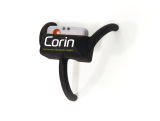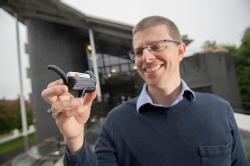WMG News - Latest news from WMG
New pelvis motion tracking technology to transform hip replacement decisions
A new pelvis motion tracking device developed by WMG, at the University of Warwick, can help detect flexible pelvises without numerous x-rays, to determine who will benefit from more advanced surgical planning before hip replacement surgery.
Researchers at WMG’s Institute of Digital Healthcare and Professor Richard King, of University Hospital Coventry and Warwickshire - and Honorary Professor at Warwick Medical School, have developed a small device that can be put at the bottom of your back to scan the movement of your pelvis prior to a hip replacement.
Patients who have pelvises that rotate large amounts during movement are at higher risk of dislocation, particularly if the replacement hip is not fitted accurately. Those patients can receive a more advanced surgical plan, but it is currently difficult to identify who requires this without a number of time consuming and expensive x-rays. The pelvic motion tracking device has been developed to allow surgeons to immediately identify patients who have high levels of pelvic rotation and can therefore receive the additional surgical planning procedure.
 Dr Mark Elliott, Assistant Professor at WMG’s Institute of Digital Healthcare at the University of Warwick said:
Dr Mark Elliott, Assistant Professor at WMG’s Institute of Digital Healthcare at the University of Warwick said:
“This new device has been developed to allow surgeons to screen patients for a flexible pelvis in a matter of minutes, identifying those who are at increased risk of complications if it is not fitted accurately. This will hopefully reduce costs and save time by identifying those patients who require more accurate surgical procedures. The research team working on the project have created a design and algorithm that can accurately track the pelvis movements comparable to that currently measured by x-rays.”
Paul Gibbons, the managing director of Corin UK said:
“We are excited to see the outcomes of our partnership with WMG at the University of Warwick, University Hospital Coventry and Warwickshire, and Warwick Medical School - which has created such an innovative and potentially cost saving solution for this real problem in hip surgery. Health care professionals will get their first chance to see and find out their own pelvic rotation with the new device on our stand at the British Orthopaedic Association exhibition at the ICC in Birmingham from the 25th-28th September. Corin believes in developing such technological insights to improve patient outcomes and improve efficiency in orthopaedics.”
